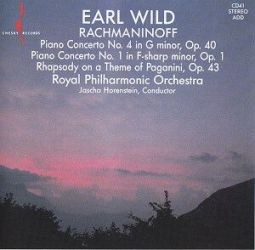Rachmaninoff - Piano Concertos Nos.4 & 1 and Rhapsody on a Theme of Paganini (2003)
Rachmaninoff - Piano Concertos Nos.4 & 1 and Rhapsody (2003)

Piano Concerto No.4 in g minor Op.40 1. Allegro 2. Largo 3. Allegro vivace Piano Concerto No.1 in f-sharp minor Op.1 4. Vivace 5. Andante 6. Allegro vivace 7. Rhapsody on a Theme of Paganini Op.43 Earl Wild – piano Royal Philharmonic Orchestra Jascha Horenstein – conductor Recorded on May 20 & June 2, 1965 in London, England
Piano Concerto No. 4 in G minor, Op. 40 is a music piece by Russian composter Sergei Rachmaninoff, completed in 1926. The work currently exists in three versions. Following its unsuccessful premiere he made cuts and other amendments before publishing it in 1928. With continued lack of success, he withdrew the work, eventually revising and republishing it in 1941. The original manuscript version was released in 2000 by the Rachmaninoff Estate to be published and recorded. The work is dedicated to Nikolai Medtner, who in turn dedicated his Second Piano Concerto to Rachmaninoff.
The concerto is probably the least known of all Rachmaninoff's piano concertos, but it is frequently performed in Russia. There may be several reasons for this. The structure was criticized for being amorphous and difficult to grasp on a single hearing. Only the second movement (Largo) contains a prominent melody, while the external movements seem to be composed mainly of virtuosic piano runs and cadenzas. Like most of Rachmaninoff's late works, the concerto has a daring chromaticism and a distinctive jazzy quality.
Sergei Rachmaninoff composed his Piano Concerto No. 1 in F-sharp minor, Op. 1, in 1892, at age 19. He dedicated the work to Alexander Siloti. He revised the work thoroughly in 1917.
This was actually Rachmaninoff's second attempt at a piano concerto. In 1889 he had begun but abandoned a concerto in C minor (the same key, incidentally, in which he would later write his Second Piano Concerto). The public was already familiar with the Second and Third Concertos before Rachmaninoff revised the First in 1917. The First is very different from his later works; in exchange for less memorable melodies, this concerto incorporates elements of youthful vivacity and impetuosity.
The differences between the 1890-1891 original and the 1917 revision reveal a tremendous amount about the composer's development in the intervening years. There is a considerable thinning of texture in the orchestral and piano parts and much material that made the original version diffuse and episodic is removed.
Of all the revisions Rachmaninoff made to various works, this one was perhaps the most successful. Using an acquired knowledge of harmony, orchestration, piano technique and musical form, he transformed an early, immature composition into a concise, spirited work. Nevertheless, he was perturbed that the revised work did not become popular with the public. He said to Albert Swan, "I have rewritten my First Concerto; it is really good now. All the youthful freshness is there, and yet it plays itself so much more easily. And nobody pays any attention. When I tell them in America that I will play the First Concerto, they do not protest, but I can see by their faces that they would prefer the Second or Third."
The Rhapsody on a Theme of Paganini in A minor, Op. 43 is a concertante work written by Sergei Rachmaninoff. It is written for solo piano and symphony orchestra, closely resembling a piano concerto. The work was written at Villa Senar, according to the score, from July 3 to August 18, 1934. Rachmaninoff himself, a noted interpreter of his own works, played the solo piano part at the piece's premiere at the Lyric Opera House in Baltimore, Maryland, on November 7, 1934 with the Philadelphia Orchestra, conducted by Leopold Stokowski.
The piece is a set of 24 variations on the twenty-fourth and last of Niccolò Paganini's Caprices for solo violin, which has inspired works by several composers. The whole composition would take approximately 25 minutes to perform. Although Rachmaninoff's work is performed in one stretch without breaks, it can be divided into three sections, corresponding to the three movements of a concerto: up to variation 11 corresponds to the first movement, variations 12 to 18 are the equivalent of a slow movement, and the remaining variations make a finale.
download: uploaded yandex 4shared mediafire solidfiles mega filecloudio nornar ziddu
Last Updated (Friday, 28 March 2014 20:52)








